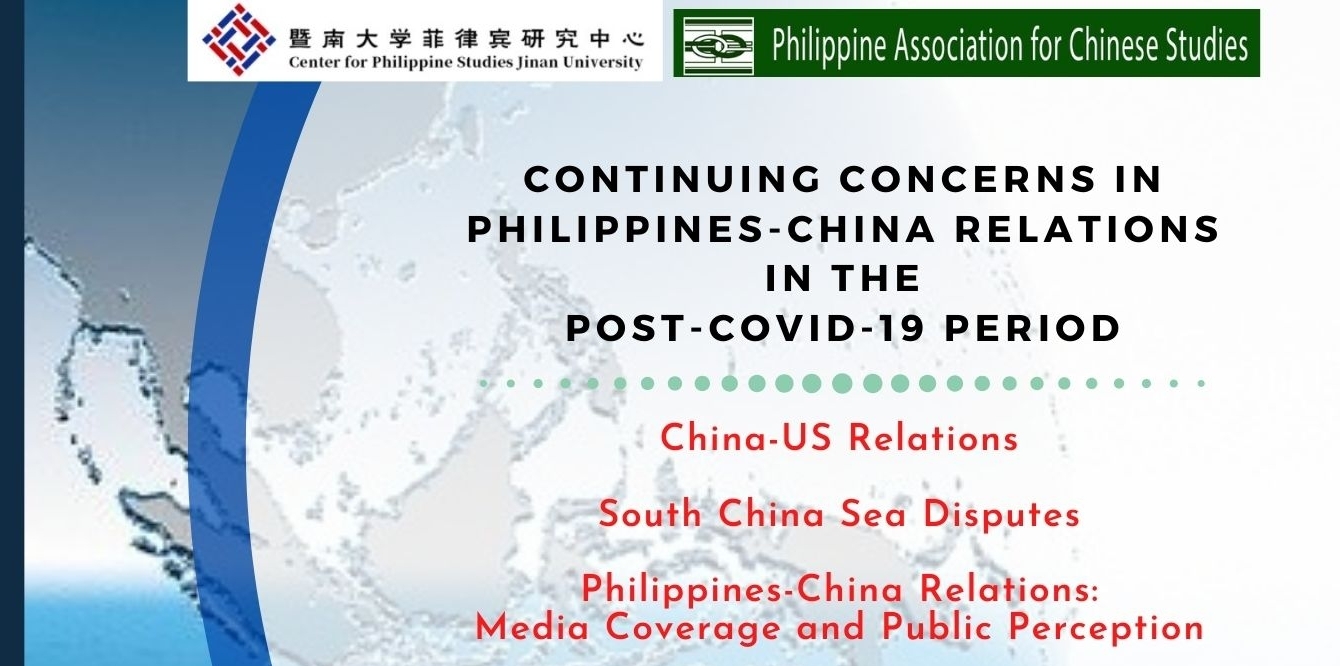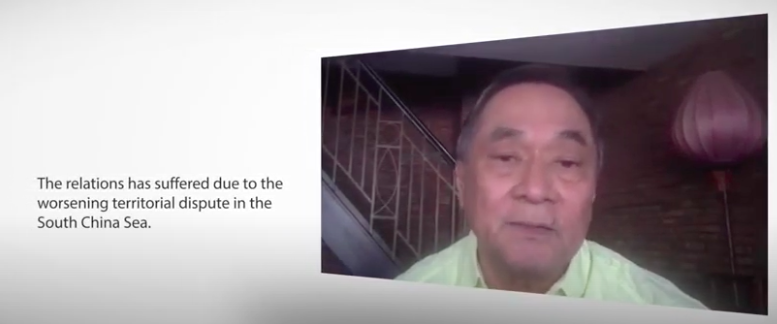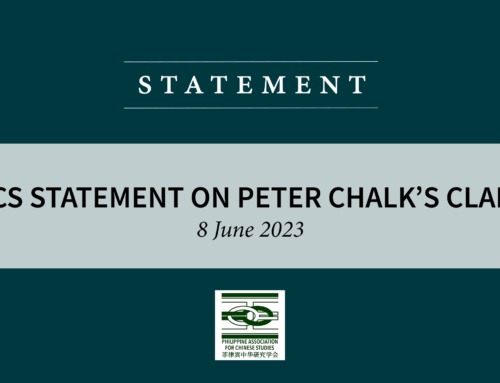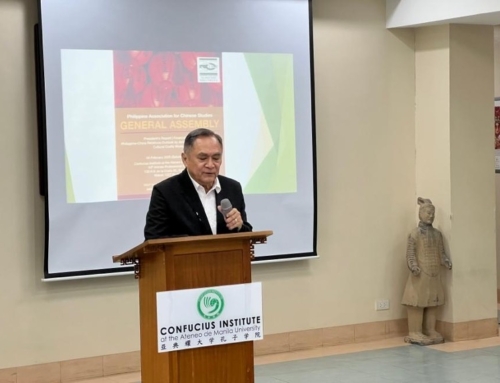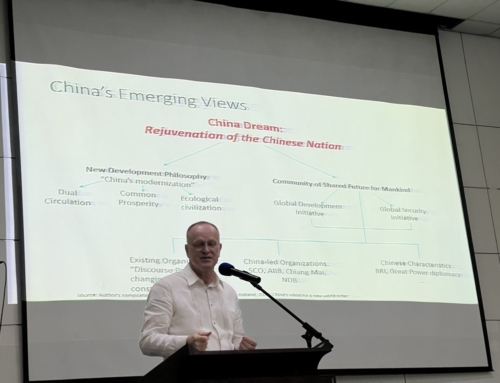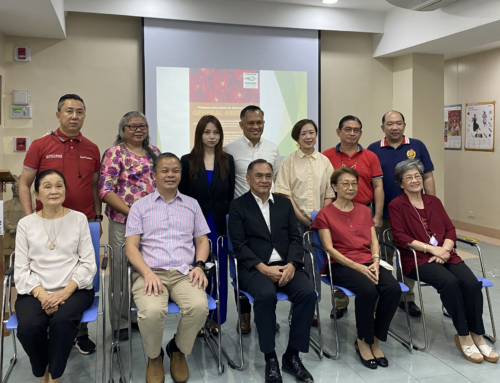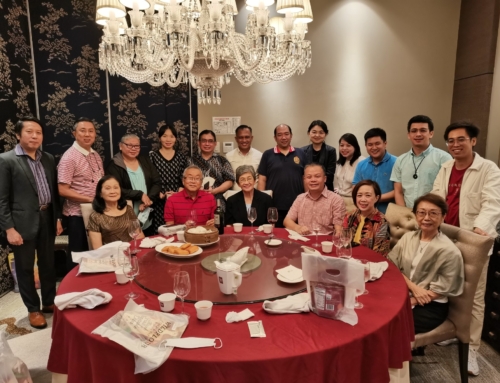by Dave’s Almocera and Micha Dianne Reoyan
21 November 2020 – Compartmentalizing ties to sidestep the Philippines and China’s differences has been an essential facet of the two countries’ relations. However, various maneuvers are needed to overcome these challenges, especially in a post-Covid-19 social landscape. This has brought the Philippine Association for Chinese Studies (PACS) to organize a webinar last November 6, 2020, on the “Continuing Concerns in Philippine-China Relations in the Post-Covid-19 Period.” The webinar discussed two focal points: first, the Philippine-China Relations: Media Coverage and Public Perceptions, and second, the China-US relations and the South China Sea Dispute.
 In his presentation, the PACS board member and foreign affairs and security analyst Lucio Pitlo III highlighted the challenges raised by the crucial role of the media in framing the public opinion of the Philippines towards China. With the advent of the unprecedented pandemic, he argued that China’s stigma had been compounded by the media. In this context, therefore, the high level of public distrust and opposing views on China continues to rise. Mr. Pitlo advised that the Philippine media should also build a deeper understanding of China to further build our long-standing interest in our ties, which is often overlooked by other countries’ media.
In his presentation, the PACS board member and foreign affairs and security analyst Lucio Pitlo III highlighted the challenges raised by the crucial role of the media in framing the public opinion of the Philippines towards China. With the advent of the unprecedented pandemic, he argued that China’s stigma had been compounded by the media. In this context, therefore, the high level of public distrust and opposing views on China continues to rise. Mr. Pitlo advised that the Philippine media should also build a deeper understanding of China to further build our long-standing interest in our ties, which is often overlooked by other countries’ media.
In his keynote address, PACS Honorary Fellow Mr. Jaime Florcruz emphasized how Philippine ties with China have loomed large in the Filipino people’s daily lives through media
coverage as a number of contentious issues remain between the Philippines and China — on top of that is the South China Sea dispute. Thus, reflecting the moun
ting public distrust of media coverage, it is a long-term challenge for China to change and improve its unsavory image in the eyes of many Filipinos. Mr. Florcruz suggests that China, similar to the US, Japan, and South Korea, should start intelligently projecting its soft power through diplomacy and the media. In addition, with the possibility of China developing an affordable and successful vaccine for the Philippines, the Covid-19 pandemic period provides a good opportunity.
Dr. Ju Hailong, a professor at the Jinan University School of International Studies and a maritime security analyst, spoke about the important impact of the relationship between the US and China and between the Philippines and China. He expects the ties between the US and China will involve more pointed contact between the leaders of the two countries. An aggressive American strategy toward China may be established by US political coalitions. Also, increased competition is seen between two states in the technology sector. In addition, the distinction between China and the US in the world order will become more evident in the long run. On the other hand, as the administration of President Duterte is about to end, Dr. Ju is wary of the next administration’s prospects. He sees that most political groups are pro-America, and he anticipates a shift in Philippine foreign policy towards China. He pointed out how the lawmakers of the US and the Philippines decide future relations between the US and China and the Philippines and China.
Dr. Li Kaisheng, professor at the Shanghai Academy of Social 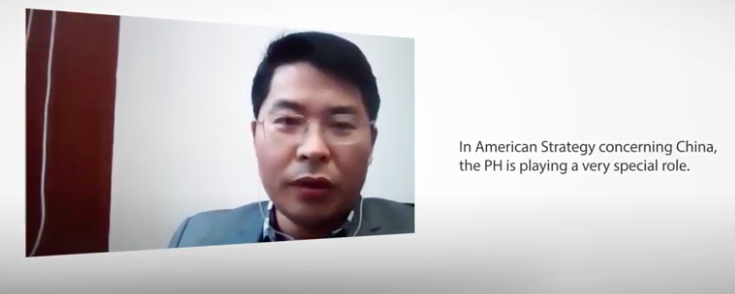 Sciences, underscored the crucial role of the Philippines in the US strategy against China, particularly in the South China Sea dispute. As a tool against China, he stressed the strategic nature of the disputed islands for the US. As the Philippines is trapped between two major powers, he suggested the following key points for the independent Philippine-China relationship: compartmentalizing bilateral relations between the US and China with the Philippines and China; expanding socio-economic cooperation between the Philippines and China; and continuing talks on the South China Sea conflict.
Sciences, underscored the crucial role of the Philippines in the US strategy against China, particularly in the South China Sea dispute. As a tool against China, he stressed the strategic nature of the disputed islands for the US. As the Philippines is trapped between two major powers, he suggested the following key points for the independent Philippine-China relationship: compartmentalizing bilateral relations between the US and China with the Philippines and China; expanding socio-economic cooperation between the Philippines and China; and continuing talks on the South China Sea conflict.
In conclusion, PACS Honorary Fellow Dr. Wilfrido Villacorta shared his views on the present perspective of the Philippines. He argued that the perceived pro-American position of the Philippines can be traced back to the humane American 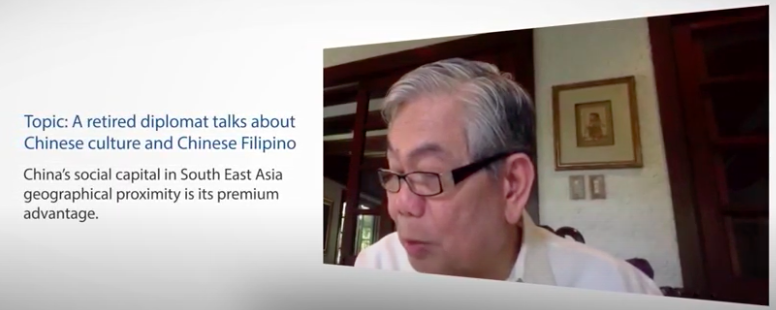 occupation in contrast with the ill-treatment faced by the Filipinos during Spanish and Japanese imperialism. The Americans empowered Filipinos and taught them the “American way of life.” In comparison, despite its long history of trade, migration, mixed marriages, and common traditional conduct with the Philippines and other Southeast Asian states, China’s social capital has been ignored.
occupation in contrast with the ill-treatment faced by the Filipinos during Spanish and Japanese imperialism. The Americans empowered Filipinos and taught them the “American way of life.” In comparison, despite its long history of trade, migration, mixed marriages, and common traditional conduct with the Philippines and other Southeast Asian states, China’s social capital has been ignored.
As Mr. Jaime Florcruz emphasized, the Philippines should navigate a neutral direction by decoupling and hedging while seizing the opportunities that both the US and China have to offer. But as Dr. Villacorta argues, “It takes two to tango. Do the Chinese trust us (Filipinos) enough?”
This PACS webinar was organized in partnership with the Center for Philippines Studies of Jinan University. It was held through Zoom and attended by 103 participants from the Chinese, Malaysian, and Singapore embassies in the Philippines, local and foreign media, academe, and many others from the Philippines and China.
Did you miss this webinar, Continuing Concerns in Philippines-China Relations in the Post-COVID-19 Period?
Panel I. China-US Relations and the South China Sea Disputes
Panel 2. Philippines-China Relations: Media Coverage and Public Perception
Watch it on youtube! Check these links:
